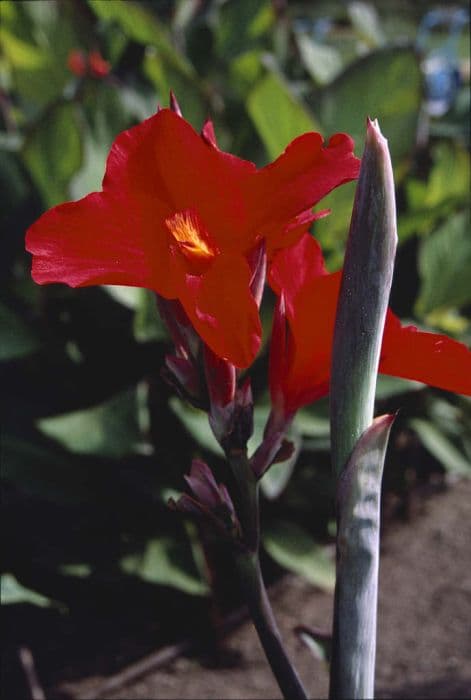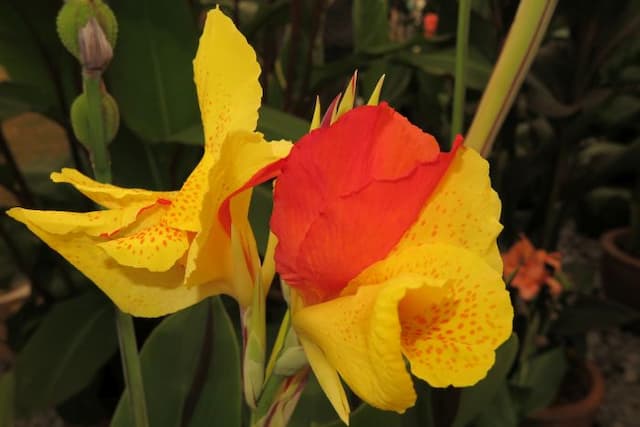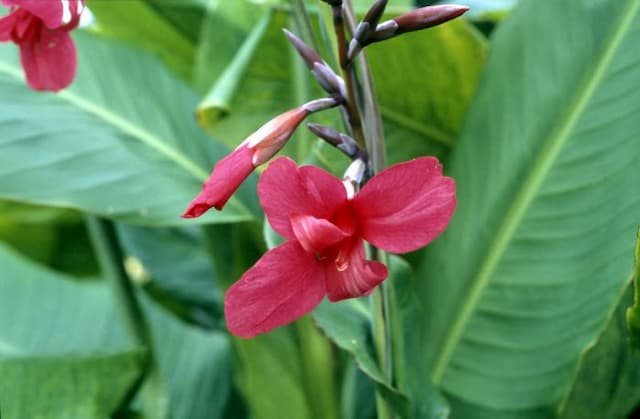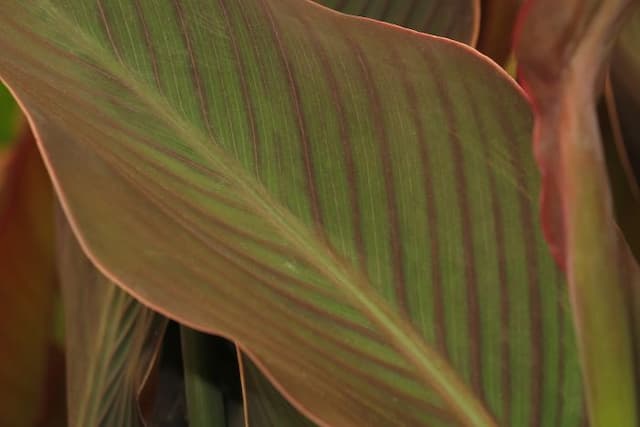Canna Lily Canna 'General Eisenhower'

ABOUT
Canna 'General Eisenhower' is a striking plant known for its vibrant and lush foliage coupled with bold and showy flowers. The leaves of this Canna boast a deep bronze-purple hue that adds a dramatic contrast against the typical greens in a garden setting. Their broad, banana-like leaf structure creates a tropical look that can provide a lush backdrop for other plants or stand out when used as a focal point. The flowers of 'General Eisenhower' are equally impressive, with large, iris-like blooms that rise above the foliage on sturdy stalks. These blossoms unfurl in a rich shade, often described as a fiery red or deep orange, which catches the eye and adds warmth to the landscape. The petals have a slightly ruffled appearance, adding texture and depth to the flower clusters. Together, the dark leaves and bright flowers of Canna 'General Eisenhower' form a dramatic and contrasting display that can enhance the visual appeal of any garden space where color and a tropical feel are desired. The overall appearance of this plant exudes strength and vigor, much like the historic figure it is named after.
About this plant
 Names
NamesFamily
Cannaceae
Synonyms
Canna Lily, Canna General Eisenhower
Common names
Canna 'General Eisenhower'
 Toxicity
ToxicityTo humans
The Canna, specifically the variety 'General Eisenhower', is generally not considered toxic to humans. There are no significant reports or studies indicating that ingesting parts of this plant causes poisoning. Therefore, no symptoms of poisoning are commonly associated with the Canna for humans.
To pets
The Canna plant is also typically considered non-toxic to pets such as dogs and cats. It is not known to contain any substances that would cause serious poisoning in pets. As with any non-food plant, ingestion of large amounts could potentially cause mild gastrointestinal upset due to the unusual material in the digestive tract, but no severe toxicity is expected from the Canna plant.
 Characteristics
CharacteristicsLife cycle
Perennials
Foliage type
Deciduous
Color of leaves
Varies
Flower color
Red
Height
5 feet (1.5 meters)
Spread
2 feet (0.6 meters)
Plant type
Bulb
Hardiness zones
7
Native area
Tropical Americas
Benefits
 General Benefits
General Benefits- Ornamental Value: Canna 'General Eisenhower' boasts striking foliage and vibrant flowers that add a splash of color to garden landscapes.
- Drought Tolerance: Once established, it can tolerate periods of low water, making it suitable for drought-prone areas.
- Easy Maintenance: It is relatively easy to care for, requiring minimal upkeep beyond regular watering and occasional fertilizing.
- Rapid Growth: This plant grows quickly, providing a fast way to fill in empty spaces in the garden.
- Pest Resistance: It is known for being resistant to many common pests, thereby reducing the need for chemical treatments.
- Attracts Pollinators: The flowers attract pollinators such as bees and hummingbirds, supporting local ecosystems.
- Versatility: It can be planted in borders, beds, and containers, offering versatility in garden design and landscaping.
- Seasonal Interest: It provides seasonal interest with its long blooming period during the warmer months.
- Soil Adaptability: Canna 'General Eisenhower' can adapt to a variety of soil conditions, although it prefers well-draining, rich soil.
 Medical Properties
Medical PropertiesThis plant is not used for medical purposes.
 Air-purifying Qualities
Air-purifying QualitiesThis plant is not specifically known for air purifying qualities.
 Other Uses
Other Uses- Canna 'General Eisenhower' can be used in water management areas as it can help in removing excess nutrients and pollutants from wetlands and ponds through phytoremediation.
- The plant's large leaves can serve as a natural wrapping material for food items in place of plastic or foil, similar to how banana leaves are used in some cultures.
- Canna rhizomes are sometimes dried and ground to create a natural purple or magenta dye for textiles and handicrafts.
- Cannas can be planted to reduce soil erosion with their dense root systems which help stabilize soil on slopes and banks.
- Since canna thrives in humid conditions, it can be used in greenhouse settings to maintain humidity levels that benefit other plants.
- When dried, the fibrous leaves of the 'General Eisenhower' canna are used in the creation of bio-composite materials as a renewable resource.
- The hollow stems of the canna can be dried and used as natural plant supports or stakes in gardens.
- Can be used as a seasonal privacy screen in gardens due to its tall growth and dense foliage.
- Canna seeds have a hard outer shell and can be used in jewelry-making or as beads for craft projects.
- Gardeners sometimes use the stalks of mature canna plants as natural trellises to support climbing vegetables or flowers.
Interesting Facts
 Feng Shui
Feng ShuiThe Canna is not used in Feng Shui practice.
 Zodiac Sign Compitability
Zodiac Sign CompitabilityThe Canna is not used in astrology practice.
 Plant Symbolism
Plant Symbolism- Patriotism: Named after General Dwight D. Eisenhower, the Canna symbolizes patriotism and honor, reflecting the respect and admiration for the leadership and service of the General during World War II and his subsequent presidency.
- Strength and Power: The robust nature of the plant and its bold flowers can symbolize strength and power, much like a military general's presence and influence.
- Exotic Beauty: With its striking flowers and foliage, the Canna plant is often associated with exotic beauty and uniqueness, capturing attention in any garden.
- Confidence: The tall and upright growth habit of the Canna plants exudes confidence and assertiveness, standing out in the landscape with a commanding presence.
 Water
WaterCanna Lilies should be watered thoroughly, allowing the soil to become evenly moist but not soggy. During the growing season, water them once a week with about 1-2 gallons per plant, depending on the climate and weather conditions. In hotter, dryer periods, they may require additional water to keep the soil consistently moist. Canna Lilies prefer a balance, so avoid letting the soil dry out completely or remain waterlogged.
 Light
LightCanna Lilies thrive in full sun conditions, ideally receiving at least 6 to 8 hours of direct sunlight each day. They perform best when placed in a location that offers bright, unfiltered sunlight throughout the day, which promotes vigorous growth and maximal flowering.
 Temperature
TemperatureCanna Lilies are tropical plants and prefer temperatures between 60°F and 90°F. They can tolerate minimum temperatures down to about 55°F but should be protected from frost. Ideal growing conditions include warm days and mild nights to encourage growth and flowering.
 Pruning
PruningPrune Canna Lilies to remove spent flowers and yellowing leaves, which encourages further blooming and maintains plant appearance. Pruning should be done as needed throughout the growing season. The best time to do a major prune is late winter or early spring before new growth begins.
 Cleaning
CleaningAs needed
 Soil
SoilCanna lilies, including the variety 'General Eisenhower', require a well-draining, fertile soil rich in organic matter. A mix of two parts loam, one part peat moss, and one part perlite or coarse sand is ideal. Ensure the soil has a pH between 6.0 and 6.5 for optimal growth.
 Repotting
RepottingCanna lilies should be repotted every two to three years to provide fresh soil and room for growth. Repotting is typically done in the spring when new growth emerges.
 Humidity & Misting
Humidity & MistingCanna lilies thrive in moderate to high humidity levels but are quite adaptable. An average humidity of 40-60% is sufficient for healthy growth.
 Suitable locations
Suitable locationsIndoor
Provide bright light, warm temps, and rich soil for indoor growth.
Outdoor
Plant in full sun, enrich soil, mulch, and water regularly.
Hardiness zone
7-11 USDA
 Life cycle
Life cycleCanna 'General Eisenhower', commonly referred to as Canna Lily, begins its life cycle as a rhizome, which is a horizontal underground stem that functions as a storage organ. In spring, new shoots emerge from the rhizomes and develop into tall, sturdy stalks with large, banana-like leaves. Throughout the summer, the Canna Lily produces vibrant, showy flowers that are attractive to pollinators, such as bees and hummingbirds. After flowering, a capsule containing seeds forms, though many gardeners propagate Canna Lily by dividing the rhizomes rather than relying on seed production. In fall, as temperatures drop, the plant's aerial parts die back. The rhizomes overwinter in the soil and become dormant, ready to regenerate in the next growing season.
 Propogation
PropogationPropogation time
Spring-Summer
For the Canna 'General Eisenhower', the most popular method of propagation is through division of its rhizomes. This is typically done in spring as the plants emerge from dormancy. Gardeners should carefully dig up the clumps of rhizomes and gently separate them using their hands or a sharp knife, making sure that each section has at least one eye or growing point. These sections can then be replanted immediately, setting them about 4 inches deep (approximately 10 centimeters) and spaced 1 to 2 feet apart (30 to 60 centimeters) to ensure adequate room for growth. Adequate watering after planting is crucial to encourage establishment of the new plants.









